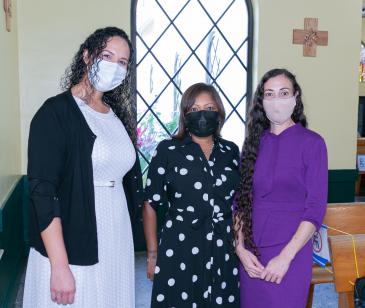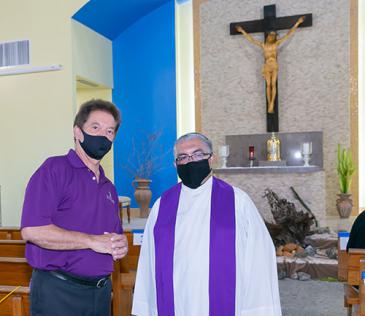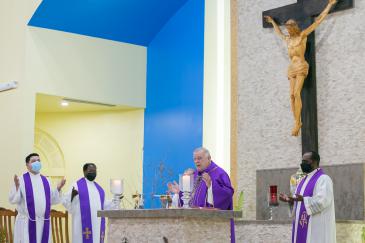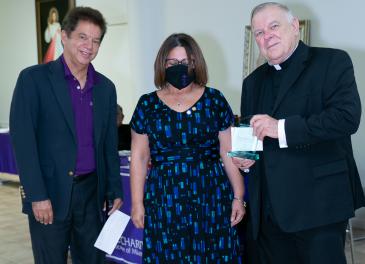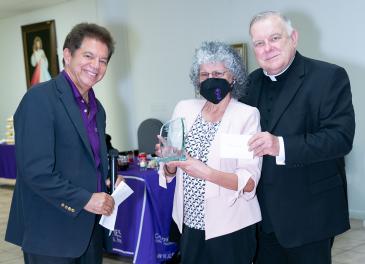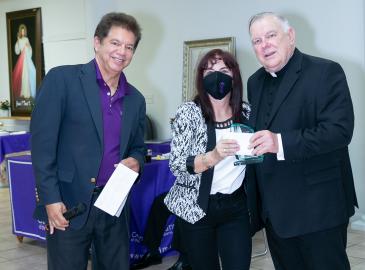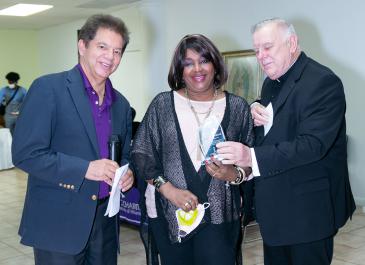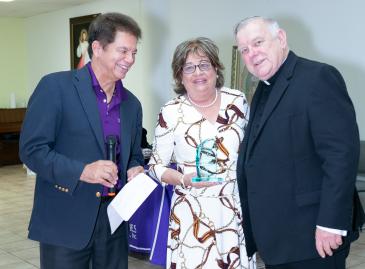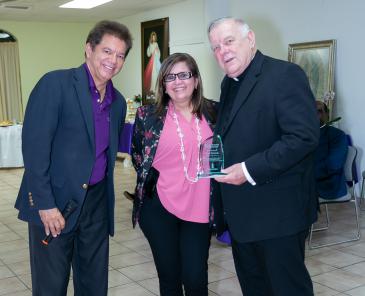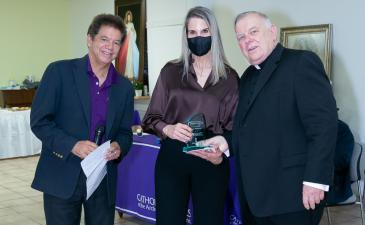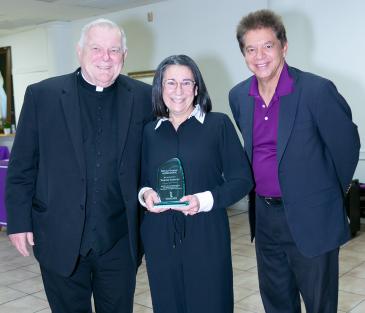By Rocio Granados - La Voz Catolica
Photography: ROBERTO GUTIERREZ | FC
- See related story: Catholic Charities: By the numbers
- Read Archbishop Thomas Wenski's homily: Catholic Charities: a fruitful tree
MIAMI | 90 years have passed since four priests and several members of the St. Vincent de Paul Society established Associated Catholic Charities, what we know today as Catholic Charities of the Archdiocese of Miami.
It was a time of crisis. A few years earlier, in 1926, South Florida had suffered a direct hit from the “Great Miami Hurricane,” a category 4 storm that destroyed a large part of the city. The havoc caused by the hurricane, the poverty and desperation were aggravated by the Great Depression of 1929. Amid these circumstances, on March 8, 1931, the provision of assistance and social services to poor families was formalized.
“90 years ago, the Catholics of this area, along with their pastors, established what today we know as Catholic Charities,” said Archbishop Thomas Wenski during the 90th anniversary Mass, which he celebrated March 26, 2021 at St. Joachim Church in southern Miami-Dade County.
The 90th anniversary activities also included recognition of 14 staff members with between 25 and 40 years of service, and the dedication and blessing by Archbishop Wenski, March 6, 2021, of St. Bede’s Village, a 37-unit affordable housing complex for single men and workers in Key West.
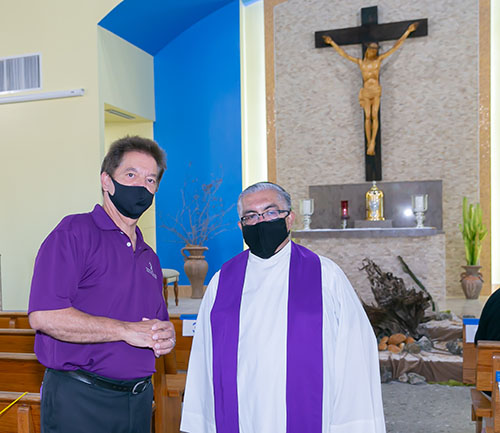
Photographer: ROBERTO AGUIRRE | FC
Peter Routsis-Arroyo, CEO of Catholic Charities, speaks to Msgr. Roberto Garza, pastor at St. Joachim Church and chair of the agency's board of directors, before the start of the Mass marking Catholic Charities' 90th anniversary, March 26, 2021.
Catholic Charities is one of the largest non-governmental providers of social services in Miami-Dade, Broward and Monroe counties. Its motto: We serve people not because they are Catholic; we serve people because we are Catholic.
For CEO Peter Routsis-Arroyo, Catholic Charities “is the Church living out its mission of love and mercy and social justice and helping those in need with a priority option on the most vulnerable population, the poor.”
And that’s what the agency has done since its establishment, which predates the archdiocese’s own creation in 1958. With the passage of time and resulting changes, Catholic Charities has had to adapt its work to meet current needs, and that has not changed.
“It is something we have done over the 90 years, whether it was receiving unaccompanied Cuban children from Pedro Pan in the sixties to receiving unaccompanied minors from Central America today,” said Routsis-Arroyo.
He arrived in the archdiocese to take the helm of Catholic Charities in 2018, after the retirement of the previous CEO, Deacon Richard Turcotte. Routsis-Arroyo brought his long experience working for other Catholic Charities agencies: He directed the Diocese of Venice’s agency for 20 years, and worked five years in Connecticut.
During the past 90 years, Catholic Charities has been part of the history of the archdiocese, “and South Florida would not be what it is today without the influence of Catholic Charities over the years,” Archbishop Wenski said.

“Catholic Charities has been a fruitful tree,” the archbishop added, mentioning how the agency responded to the Cuban refugee crisis in the 1960s “months before the federal government caught up.”
That response turned into Operation Pedro Pan, through which around 14,000 unaccompanied Cuban minors arrived in Miami and were cared for by the Church until they were reunited with their families.
Catholic Health Services, one of the leading Catholic health care providers in South Florida, was originally part of Catholic Charities. Another offshoot isCatholic Legal Services, which provides free or low-cost legal representation to South Florida immigrants.
Catholic Charities currently offers eight social service programs that provide childcare for low-income families, day care for seniors, counseling, food distribution and nutritional programs for seniors, help with rental payments, and support for substance abusers and the homeless. In fiscal year 2019-20, the agency had 375 employees and a $32 million budget, and served 5,264 people through its various programs.
THE COVID PANDEMIC
Having confronted major crisis during its 90 years, from the arrival of Cuban refugees in the 1960s to devastating hurricanes in the ‘90s and 2000s, and more recently the arrival of unaccompanied minors from Central America, Catholic Charities also was prepared to face the COVID-19 pandemic. It never closed its doors to the community.
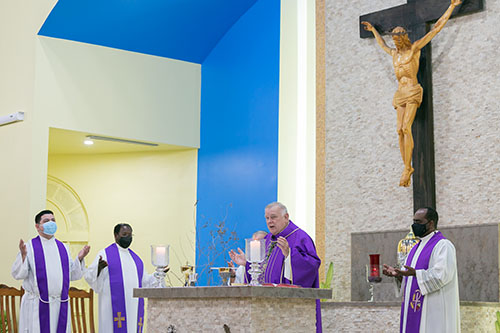
Photographer: ROBERTO AGUIRRE | FC
Archbishop Thomas Wenski presides at the Mass marking Catholic Charities' 90th anniversary, which was celebrated at St. Joachim Church in Miami March 26, 2021. Concelebrating, from left, are Father Pedro Torres, parochial vicar at St. Joachim; Spiritan Father Alexander Ekechukwu, pastor of Holy Redeemer Church in Liberty City; and Father Reginald Jean-Mary, administrator of Notre Dame d'Haiti Mission in Miami, far right. Also concelebrating but hidden in the photo is Msgr. Roberto Garza, pastor of St. Joachim and chair of Catholic Charities' board of directors.
Most of its programs and services care directly for clients. Its homeless shelters, St. Luke’s Center for those dealing with alcohol and substance abuse, and shelter for unaccompanied minors remained open 24 hours a day seven days a week. “Those facilities, while you take all of the precautions necessary, they have to remain open,” Routsis-Arroyo said.
The agency also modified its services to be able to continue the work. Counseling and mental health services moved online to a Telehealth platform. Delivering meals to seniors in its daycare centers and nutritional programs became even more direct. “Now we deliver to elders’ homes close to 1,000 meals a day,” Routsis-Arroyo said.
The day centers and congregate meal sites for seniors 65 and over had to close because it was unsafe to gather them in groups. But Catholic Charities’ food distribution program expanded. Meal distribution sites were established at local parishes and through connections with other social service organizations, allowing Catholic Charities to reach even more needy families throughout the pandemic.
“We really did a lot more food distribution over this past year than we have ever really done before,” said Routsis-Arroyo, adding that “funding has come to us, I think, because of the good reputation that we have. The counties and the cities and the state, and the federal level, they were looking to us to be able to help those in need.”
CHILD CARE
Catholic Charities’ work has always focused on supporting families, but most of those served by the agency today are children — around 42%. Aside from the public school system, Catholic Charities is the largest provider of Head Start programs for children ages 0-5 in Miami-Dade, including providing childcare, meals and snacks and preparation for pre-school.
From the time of Pedro Pan through today, Catholic Charities has maintained one of the only shelters in Florida that can accommodate children, ages 0 to 17, who have crossed the border into the U.S. as unaccompanied minors. The agency is licensed by the Florida Department of Children and Families.
International aid “is also part of what we do,” said Routsis-Arroyo. “We will be continuing to help our brothers and sisters in the Bahamas for the next two to three years,” he added, to offset the damages done by Hurricane Dorian in 2018.
Catholic Charities also sent food to Guatemala, Honduras and Nicaragua after the disasters caused by two hurricanes last year.
Looking at the future, Routsis-Arroyo said Catholic Charities is planning to expand the New Life homeless shelter as well as its involvement in building affordable housing, to alleviate that crisis in South Florida.
“Catholic Charities has touched the lives of many people in a positive way for 90 years, and I have no doubt its presence will be felt in the lives of those in need for 90 more years,” he said. “I think the core, as far as helping the most vulnerable, is something that we stayed true to no matter what.”
To learn more about the services offered by Catholic Charities, go to www.ccadm.org or call 305-754-2444.
Freelancer Cristina Cabrera Jarro contributed to this report.
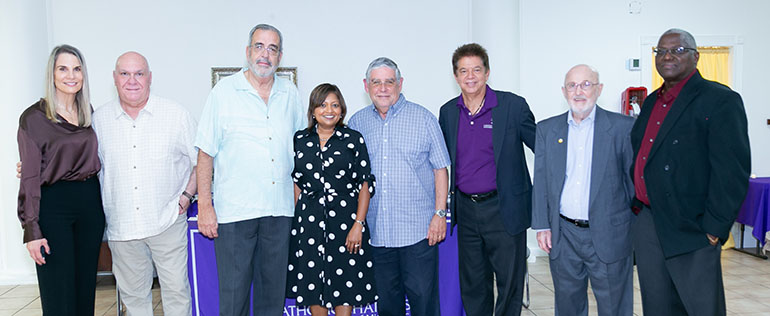
Photographer: ROBERTO AGUIRRE | FC
Catholic Charities employees pose with former Pedro Pans who are now members of the agency's board of directors after the 90th anniversary celebration, held March 26, 2021 at St. Joachim Church in Miami. From left: Gladys Palacios, John Louriel, Oreste Wrves, Mel Carmona, Devika Austin, Peter Routsis-Arroyo, Tom Comerford and Jules Jones.

